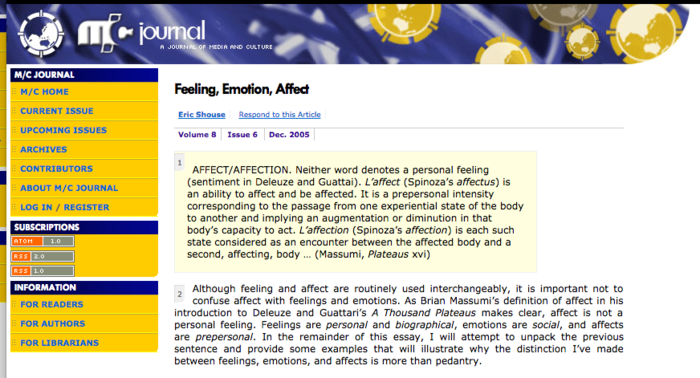

It is a prepersonal intensity corresponding to the passage from one experiential state of the body to another and implying an augmentation or diminution in that body's capacity to act. L'affect (Spinoza's affectus) is an ability to affect and be affected. Neither word denotes a personal feeling ( sentiment in Deleuze and Guattari). In his notes on the terminology employed, the translator Brian Massumi gives the following definitions of the terms as used in the volume:ĪFFECT/AFFECTION. The terms "affect" and "affection" came to prominence in Gilles Deleuze and Félix Guattari's A Thousand Plateaus, the second volume of Capitalism and Schizophrenia. Henri Bergson contends in Matter and Memory (1896) that we do not know our body only "from without" by perceptions, but also "from within" by affections (French: affections). Affects are transitional states or modes in that they are vital forces by which the organism strives to act against other forces which act on it and continually resist it or hold it in check. In Spinoza's view, since God's power of activity is infinite, any affection which increases the organism's power of activity leads to greater perfection. pain or sorrow ( tristitia), defined as "man's transition from a state of greater perfection to a state of less perfection".pleasure ( laetitia), defined as "man's transition from a state of less perfection to a state of greater perfection" and.desire ( cupiditas) or appetite ( appetitus), defined as "the very essence of man insofar as his essence is conceived as determined to any action from any given affection of itself".They are nearly all manifestations of the three basic affects of: In Part III, "Definitions of the Emotions/Affects", Spinoza defines 48 different forms of affect, including love and hatred, hope and fear, envy and compassion. Īffect is thus a special case of the more neutral term "affection" ( affectio), which designates the form "taken on" by some thing, the mode, state or quality of a body's relation to the world or nature (or infinite "substance"). In Baruch Spinoza's Ethics, Part III Definition 3, the term "affect" ( affectus, traditionally translated as "emotion") is the modification or variation produced in a body (including the mind) by an interaction with another body which increases or diminishes the body's power of activity (potentia agendi):īy affect I understand affections of the body by which the body's power of acting is increased or diminished, aided or restrained, and at the same time, the ideas of these affections. The term "affect" is central to what has become known as the "affective turn" in the humanities and social sciences. Affects are difficult to grasp and conceptualize because, as Spinoza says, "an affect or passion of the mind is a confused idea" which is only perceived by the increase or decrease it causes in the body's vital force.

Subsequent philosophical usage by Gilles Deleuze, Félix Guattari and their translator Brian Massumi, while derived explicitly from Spinoza, tends to distinguish more sharply than Spinoza does between affect and what are conventionally called emotions. The word affect takes on a different meaning in psychology and other fields.įor Spinoza, as discussed in Parts Two and Three of his Ethics, affects are states of mind and body that are related to (but not exactly synonymous with) feelings and emotions, of which he says there are three primary kinds: pleasure or joy ( laetitia), pain or sorrow ( tristitia) and desire ( cupiditas) or appetite. For other uses, see Affect (disambiguation).Īffect (from Latin affectus or adfectus) is a concept, used in the philosophy of Baruch Spinoza and elaborated by Henri Bergson, Gilles Deleuze and Félix Guattari, that places emphasis on bodily or embodied experience. For affect in psychology, see Affect (psychology). This article is about the philosophical concept.


 0 kommentar(er)
0 kommentar(er)
